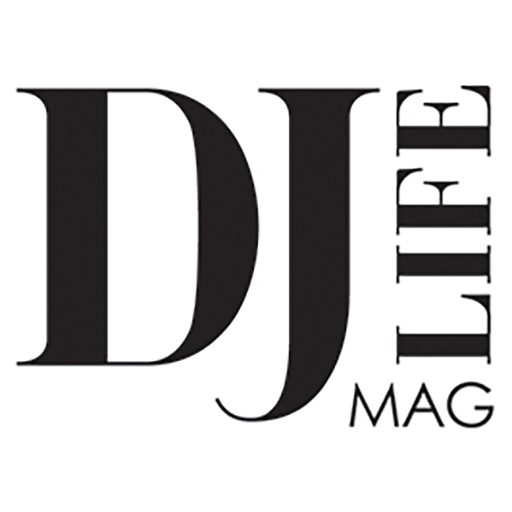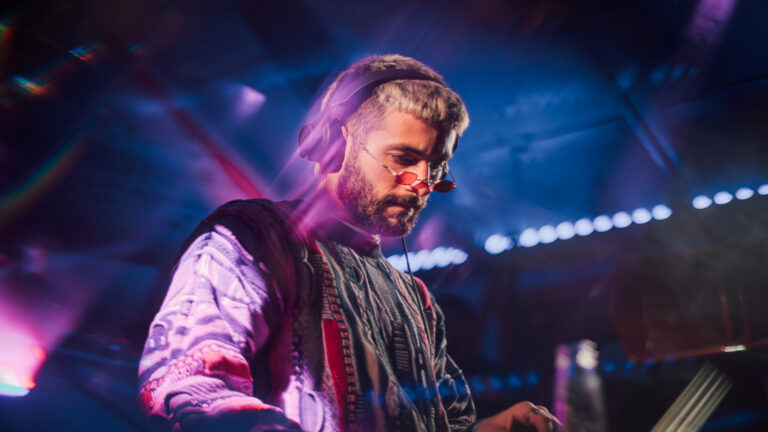By his own admission, Lubelski is a bit of a modular-synth maniac. And if you listen to tracks like “Asylum” from Happy Accidents, his recent album on Dirtybird, you’ll quickly get the picture.
It’s a manic tech-house excursion that fires you thru a gauntlet of compelling club sounds – nervy bassline, commanding kick drum, acid squiggles, the lot. It’s a thrilling ride that, according to his studio approach, resulted from the “conversations” he had with his synths.
Quite a diverse outing, Happy Accidents is one of electronic music’s best recent full-lengths, and “All This Technology,” his recent tech-house collab with Mikey Lion on Desert Hearts delivers the goods as well. He’s a genuine talent whose tracks have found a solid place in the American underground and beyond.
As Lubelski (aka Jake Lubell) prepped for his Saturday-night gig at Las Vegas’ Discopussy club, we grabbed a few minutes from the L.A.-based DJ/producer/multi-instrumentalist.
DJ Life Mag: You’ve said that using “modular was like having a conversation with a synth.” Tracks like “Asylum” would seem to be an example of that. Can you expound a little on your approach to this album?
Lubelski: I’m mostly talking about the fact that analog gear isn’t as “perfect” as digital synths. There’s more randomness in dealing with modular gear and a level of uncertainty that’s much more difficult to get with VSTs. I like to think of it like a conversation because I am essentially telling my modular rack to do something and it tells me something back, and oftentimes, something unexpected. Hence, why I called the album Happy Accidents.
DJ Life Mag: In a world of EPs and singles, why an album? Why Dirtybird?
Lubelski: Well, I released my first album, The Universal Groove, on my own label [Percomaniacs] at the start of the pandemic, not intentionally. When I worked at the radio station where I went to university, I spent a lot of time cataloging the electronic-music albums in their collection. I remember starting from Z and working my way to A and stumbling upon [Claude] VonStroke’s first few records. I didn’t know I’d ever release an album on Dirtybird then, but I definitely recall thinking, “If I ever want to be taken seriously as an artist, I have to release albums.” There’s something special about releasing a body of work like an LP. There’s a lot of thought that goes into it conceptually, and I think they are important in creating, not only a timeline of reference of growth as an artist, but also a narrative around who you are as an artist and what you might try to say.
DJ Life Mag: For you in the studio, what’s your mixture of hardware and software?
Lubelski: I use Ableton Live a lot. I rarely sequence any of the modular recordings with MIDI from my computer unless I’m trying to do something very specific. I really enjoy touching the synthesizers, the sensation of the physicality of it feels more substantial to me and makes the process of creating music more fun. Plus, it helps me move around and keep from developing bad posture.
DJ Life Mag: What are your main studio components?
Lubelski: I have HEDD Type 07 monitors, which are incredible. They are like a massive step up from the ADAM A7X’s – super-clean transient and frequency responses. I also have a [Sequential] Prophet-6, [Sequential Oberheim] OB-6, Moog Sub 37, Moog One, Vermona DRM1 MKIII, [Roland] SH-101, and some turntables to sample vinyl, some outboard effects gear like the Sherman Filterbank, a UA 710 Tube amp, and some others.
DJ Life Mag: Other software? Plug-ins?
Lubelski: I use a ton of different plug-ins for processing, mixing, and mastering like FabFilter, Soundtoys, Waves, iZotope, and Native Instruments. As far as making music goes, though, there’s a lot of really incredible plug-ins from Ableton’s Max for Live.
DJ Life Mag: In the DJ booth, what’s your gear?
Lubelski: I’ve been considering getting a new modular case to bring on the road with me as an FX-send, but I usually just use whatever the club has. I love the [Pioneer DJ] DJM-V10 and the [Allen & Heath] Xone 92/96, but I’m not really a stickler about what mixer I use. The CDJ-3000s from Pioneer DJ are great, as well.
DJ Life Mag: How would you describe your style of DJing and performance?
Lubelski: I like to think I mix patiently. I like to let an entire song play out; but, depending on my mood, I can get a little antsy and tease other songs to trick and tease the crowd. Stylistically and genre-wise, though, I’m really all over the place. It’s all mostly house, but I feel like I’ve been known to throw in some disco, drum-n-bass, rock-n-roll, ’80s hits, and stuff like that. I try to keep it eclectic.
DJ Life Mag: What are three tracks that are always in your DJ box?
Lubelski: Good question – tough one. Three songs that I’ve been playing a lot this tour have been “Dis Konnekt” by Dino Lenny, an edit I made of “Sticks & Stones” by Red Axes, and another edit I made of “Wicked Game” by Chris Isaak.
DJ Life Mag: What should fans expect from your gigs on this tour, especially the one in Vegas at Discopussy?
Lubelski: I’ve been playing the album out a lot and doing a bunch of live edits of tracks, like “Asylum,” where I make the last breakdown three-minutes long by looping it, slowing it down, speeding it up, throwing effects on it, etc. I work in the studio nearly every day, so fans can always expect to hear some unreleased stuff. Vegas can expect to get very synthy – that sound system is wild in there.
Lubelski will perform at Discopussy at 512 E. Freemont Street in Las Vegas on Saturday, Jan. 15. Tickets can be bought here.
To check out more interviews, click here.


